

This stress may manifest as family or relationship problems, serious health problems, problems in the workplace or even financial problems to name a few.
Developing resilience can help you cope adaptively and bounce back after changes, challenges, setbacks, disappointments, and failures.
Resilience Coaching and Counseling: 29 Helpful Tools and Techniques. It’s a demanding world out there.
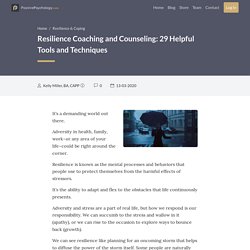
Adversity in health, family, work–or any area of your life–could be right around the corner. Resilience is known as the mental processes and behaviors that people use to protect themselves from the harmful effects of stressors. It’s the ability to adapt and flex to the obstacles that life continuously presents. Resilience Theory: What Research Articles in Psychology Teach Us (+PDF) Life is never perfect.
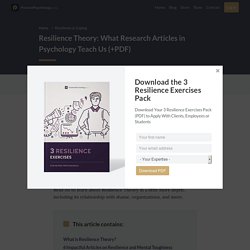
As much as we wish things would ‘just go our way,’ difficulties are inevitable, and we all have to deal with them. Resilience Theory argues that it’s not the nature of adversity that is most important, but how we deal with it. When we face adversity, misfortune, or frustration, resilience helps us bounce back. What is Resilience and Why is it Important to Bounce Back? Home » Resilience & Coping » What is Resilience and Why is it Important to Bounce Back?

(+ Quotes) One of the most popular topics in positive psychology—both in the field itself and in mainstream discussion of positive psychological concepts—is resilience. Photo by rawpixel on Unsplash To some, resilience is a sort of “miracle drug” personality trait, something that can heal all wounds and right all wrongs. While resilience may not be the end-all and be-all of personality traits, it’s such a hot topic for good reason: it is a wonderful trait to have, it is related to a plethora of positive outcomes, and—perhaps most important of all—it can be improved. Resilience Theory: What Research Articles in Psychology Teach Us (+PDF) Home » Resilience & Coping » Resilience Theory: What Research Articles in Psychology Teach Us (+PDF) Last Updated on March 10, 2019 Experiencing the loss of a loved one, sexual abuse, violence, and war; these are the things that shape us.
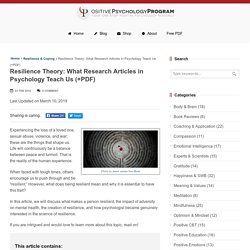
Life will continuously be a balance between peace and turmoil. That is the reality of the human experience. When faced with tough times, others encourage us to push through and be “resilient.” In this article, we will discuss what makes a person resilient, the impact of adversity on mental health, the creation of resilience, and how psychologist became genuinely interested in the science of resilience. Resilience Skills, Factors and Strategies of the Resilient Person. Resilience in Positive Psychology: Bouncing Back & Going Strong. Home » Resilience » Resilience in Positive Psychology: Bouncing Back & Going Strong The subject of resilience in positive psychology deals with the ability to cope with whatever life throws at you.
Some people can be knocked down by life and return as a stronger person than ever before. These people are called resilient. A resilient person works through challenges by using personal resources, strengths and other positive capacities of psychological capital such as hope, optimism, and self-efficacy. Overcoming a crisis by resiliency is often described as “bouncing back” to a normal state of functioning.
Psychological resilience. Psychological resilience is the ability to mentally or emotionally cope with a crisis or to return to pre-crisis status quickly.[1] Resilience exists when the person uses "mental processes and behaviors in promoting personal assets and protecting self from the potential negative effects of stressors".[2] In simpler terms, psychological resilience exists in people who develop psychological and behavioral capabilities that allow them to remain calm during crises/chaos and to move on from the incident without long-term negative consequences.
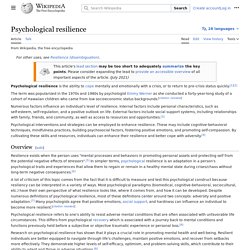
Background[edit] History[edit] The first research on resilience was published in 1973. The study used epidemiology, which is the study of disease prevalence, to uncover the risks and the protective factors that now help define resilience.[9] A year later, the same group of researchers created tools to look at systems that support development of resilience.[10] Emmy Werner was one of the early scientists to use the term resilience in the 1970s. Grit[edit] Rising Strong: Brené Brown on the Physics of Vulnerability and What Resilient People Have in Common.
By Maria Popova “If we are brave enough often enough, we will fall; this is the physics of vulnerability.”
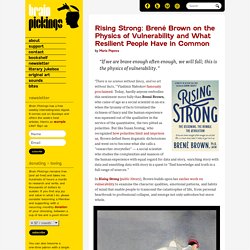
“There is no science without fancy, and no art without facts,” Vladimir Nabokov famously proclaimed. Today, hardly anyone embodies this sentiment more fully than Brené Brown, who came of age as a social scientist in an era when the tyranny of facts trivialized the richness of fancy and the human experience was squeezed out of the qualitative in the service of the quantitative, the two pitted as polarities. Are You Wired For Resilience? If you knew you had the resilience to recover from almost any challenge or experience, what might you do differently?
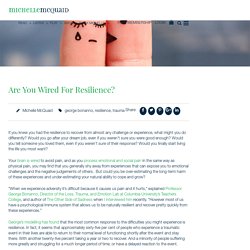
Do you Bounce Back? Find out with a Resiliency Questionnaire! Home » Resilience » Do you Bounce Back? Find out with a Resiliency Questionnaire! How well do you react to an unexpected turn of events? Do you spoil for a fight, get energised by uncertainty or crumble with the pressure? Vulnerability. Coping. Post-Traumatic Growth. Pain. Losses. Mental Health. Courage. Sublimation. A Navy SEAL Explains 8 Secrets To Grit And Resilience. Sometimes you just want to quit.

You know you shouldn’t but nothing seems better than crawling back into bed and hiding under the covers. (I am there right now, actually, with my laptop.) The emerging science of grit and resilience is teaching us a lot about why some people redouble their efforts when the rest of us are heading for the door.
Research is great, but it’s always nice to talk to someone who’s been there firsthand, and to see how theory holds up against reality. So who knows about grit and persistence? So I gave my friend James Waters a call. James and I talked for hours but what struck me was how much of what he had to say about SEAL training and his time in the teams aligned with the research on grit, motivation, expertise and how people survive the most challenging situations.
How To Boost Emotional Resilience: 10 Research-Backed Secrets. Ever dealt with a really difficult situation?
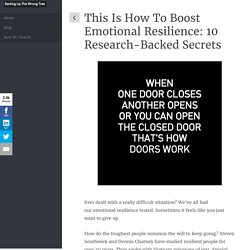
We’ve all had our emotional resilience tested. Sometimes it feels like you just want to give up. How do the toughest people summon the will to keep going? Resilience Training: How to Build Resilient Individuals and Groups. Resilience Training: How to Master Mental Toughness and Thrive. Photo by Marc Rafanell López on Unsplash Do you know someone who keeps on keeping on, no matter what life throws at them?
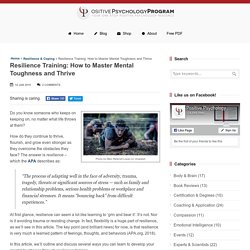
How do they continue to thrive, flourish, and grow even stronger as they overcome the obstacles they face? The answer is resilience – which the APA describes as: “The process of adapting well in the face of adversity, trauma, tragedy, threats or significant sources of stress — such as family and relationship problems, serious health problems or workplace and financial stressors. It means “bouncing back” from difficult experiences.” 27 Resilience Activities and Worksheets for Students and Adults (+PDFs) How People Learn to Become Resilient.
Norman Garmezy, a developmental psychologist and clinician at the University of Minnesota, met thousands of children in his four decades of research. But one boy in particular stuck with him. He was nine years old, with an alcoholic mother and an absent father. Each day, he would arrive at school with the exact same sandwich: two slices of bread with nothing in between. At home, there was no other food available, and no one to make any. Even so, Garmezy would later recall, the boy wanted to make sure that “no one would feel pity for him and no one would know the ineptitude of his mother.” The boy with the bread sandwich was part of a special group of children.
5 Ways to Build Resilience Every Day. Resilience is the process of effectively coping with adversity—it’s about bouncing back from difficulties. The great thing about resilience is that it’s not a personality trait; it involves a way of paying attention, thinking, and behaving that anyone can learn. World-renowned neuroscientist Richard Davidson has found evidence that mindfulness does increase resilience, and the more mindfulness meditation you practice, the more resilient your brain becomes.
The emotional soup that follows a stressful event can whip up negative stories about yourself or others that goes on and on, beyond being useful. For example, if you have an argument with your partner before leaving for work, you can end up replaying that conversation all day, which continues to proliferate anxiety or low mood far more than is necessary. Mindfulness reduces this rumination and, if practiced regularly, changes your brain so that you’re more resilient to future stressful events.
Raising Resilient Kids. Resilience in the Workplace. Self-Management. Gratitude.